Gluconeogensis Study guides, Class notes & Summaries
Looking for the best study guides, study notes and summaries about Gluconeogensis? On this page you'll find 61 study documents about Gluconeogensis.
Page 4 out of 61 results
Sort by
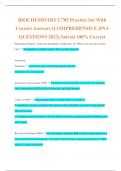
-
BIOCHEMISTRY C785 Practice Set With Correct Answers (COMPREHENSIVE DNA QUESTIONS 2023) Solved 100% Correct
- Exam (elaborations) • 25 pages • 2023
-
- $12.49
- + learn more
BIOCHEMISTRY C785 Practice Set With Correct Answers (COMPREHENSIVE DNA QUESTIONS 2023) Solved 100% Correct Hemophilia Pedigree - Father has hemophilia, mother does not. What is the outcome for their kids? ** His daughters would be carriers. This is x-link recessive. Autosomal: Dominant: ** Autosomal: males and females equally affected. Dominant: non-carrier parents polymerase chain reaction (PCR) ** The process of copying DNA in the lab. Uses Template DNA, Nucleotides (dNTPS), DNA Poly...
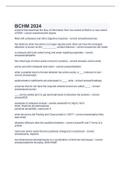
-
BCHM 2023 with verified questions and answers
- Exam (elaborations) • 9 pages • 2023
-
Available in package deal
-
- $12.99
- + learn more
scheme that describes the flow of information from one strand of DNA to a new strand of DNA central dogma filled with proteases and other digestive enzymes lysosomes the distance when two atoms no longer repulse each other yet have the strongest attraction is known as the __________ contact distance van der waals a molecule with both water-loving and water repelling properties amphipathic this chiral type of amino acids is found in proteins L-amino acids ...
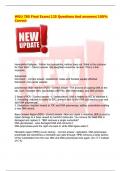
-
WGU 785 Final Exam/125 Questions And answers/100% Correct
- Exam (elaborations) • 14 pages • 2024
-
- $17.99
- + learn more
WGU 785 Final Exam/125 Questions And answers/100% Correct Hemophilia Pedigree - Father has hemophilia, mother does not. What is the outcome for their kids? - Correct answer -His daughters would be carriers. This is x-link recessive. Autosomal: Dominant: - Correct answer -Autosomal: males and females equally affected. Dominant: non-carrier parents polymerase chain reaction (PCR) - Correct answer -The process of copying DNA in the lab. Uses Template DNA, Nucleotides (dNTPS), DNA Polymeras...
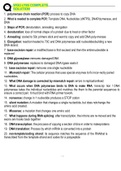
-
WGU c785 COMPLETE SOLUTION
- Exam (elaborations) • 8 pages • 2022
-
Available in package deal
-
- $13.29
- + learn more
1. polymerase chain reaction (PCR): process to copy DNA 2. What is needed to complete PCR: Template DNA, Nucleotides (dNTPS), DNA Polymerase, and DNA 3. Steps of PCR: denaturation, annealing, elongation 4. denaturation: loss of normal shape of a protein due to heat or other factor 5. Annealing: cooled to 50c primers stick and want to copy and add DNA poly- merase 6. Elongation: reaction heated to 70C and DNA polymerase add nucleotides building a new DNA strand. 7. base excision repair: a m...
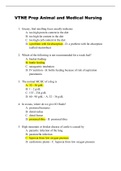
-
(answered) VTNE Prep Animal and Medical Nursing > 2022.
- Other • 13 pages • 2022
-
- $15.49
- + learn more
VTNE Prep Animal and Medical Nursing 1. Greasy, foul smelling feces usually indicates A. too high protein content in the diet B. too high fat content in the diet C. too high carb content in the diet D. a problem with fat absorption 2. Which of the following is not recommended for a weak foal? A. bucket feeding B. bottle feeding C. nasogastric intubation D. IV nutrition 3. The normal MCHC of a dog is A. 32 - 36 g/dL B. 1 - 2 g/dL C. 135 - 234 g/dL D. 60 - 98 g/dL 4. In av...
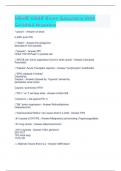
-
NBME CBSE Exam Questions With Certified Answers
- Exam (elaborations) • 144 pages • 2024
-
- $11.49
- + learn more
NBME CBSE Exam Questions With Certified Answers "-azosin" - Answer-a1 block tx BPH and HTN /."-tidine" - Answer-H2 antagonist decrease H from parietal /."prazole" - Answer-PPI inhibit *H/K ATPase* in parietal cell /.*APC/B cat* tumor suppressor found in what cancer - Answer-Colorectal Pancreatic /.*Cellular* Acute Transplant rejection - Answer-*lymphocytic* endothelitis /.*EPO released in kidney* Caused by: Causes: - Answer-Caused by: *hypoxia* sensed by peri...
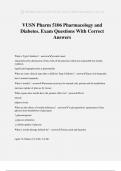
-
VUSN Pharm 5106 Pharmacology and Diabetes. Exam Questions With Correct Answers
- Exam (elaborations) • 9 pages • 2024
-
- $11.49
- + learn more
VUSN Pharm 5106 Pharmacology and Diabetes. Exam Questions With Correct Answers What is Type I diabetes? - answerjuvenile onset characterized by destruction of beta cells of the pancreas which are responsible for insulin synthesis significant hyperglycemia at presentation What are some clinical signs that a child has Type I diabetes? - answergets sick frequently has to urinate frequently What is insulin? - answerhormone necessary for normal carb, protein and fat metabolism increases upt...
This document provides a simple illustration of Gluconeogensis metabolism in human body. It’s easy to comprehend and good for pre-test review.
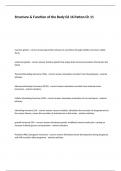
-
Structure & Function of the Body Ed 16 Patton Ch 11
- Exam (elaborations) • 5 pages • 2024
-
- $10.99
- + learn more
exocrine glands - correct answer gland that releases its secretions through tubelike structures called ducts endocrine glands - correct answer Ductless glands that empty their hormonal products directly into the blood Thyroid Stimulating Hormone (TSH) - correct answer stimulates secretion from thyroid gland - anterior pituitary Adrenocorticotropic hormone (ACTH) - correct answer stimulates secretion from adrenal cortex hormones - anterior pituitary Follicle-stimulating hormone (FSH) ...
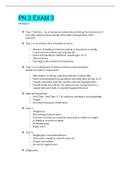
-
PN 2 EXAM 3
- Exam (elaborations) • 21 pages • 2022
-
- $14.49
- + learn more
PN 2 EXAM 3 N2 Exam 3 Type 1 Diabetes – an autoimmune dysfunction involving the destruction of beta cells, which produce insulin in the islets of Langerhans of the pancreas. Type 1 is an absolute lack of insulin secretion o Absence of insulin production; patient is dependent on insulin to prevent ketoacidosis and maintain life o Onset is frequently in childhood; usually ages 10-15 o This is forever o First sign is often Diabetic Ketoacidosis Type 2 is a combination of insulin ...

Do you wonder why so many students wear nice clothes, have money to spare and enjoy tons of free time? Well, they sell on Stuvia! Imagine your study notes being downloaded a dozen times for $15 each. Every. Single. Day. Discover all about earning on Stuvia



